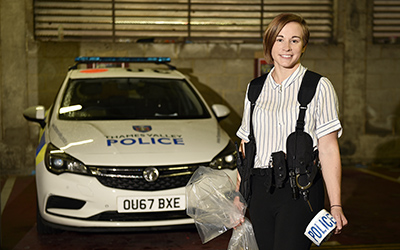Meet… Detective Constable Adele Taylor
“In my previous career in forensic science my work contributed to investigations, now I have the opportunity to lead my own.”

Role: Detective Constable, Reading Priority Crime Team (PCT)
Age at joining: 28
Length of Service: 20 months – I joined what was called the Special Entry Detective Constable (SEDC) programme back in October 2018, the programme was the forerunner for what will now be the DC-DHEP.
Career before policing
I’d always been fascinated by crime dramas like ‘A Touch of Frost’, but was initially drawn more towards the science and forensics side of things. I studied Applied Science, Photography and Psychology as A Levels before completing a degree in Forensic Science. I worked for a private forensics laboratory in DNA profiling for seven years before making the move into policing.
What inspired the move?
My previous role gave me some exposure to crime but only a small part, I found myself thinking about what the outcome of my discoveries had been. My role was also quite repetitive, I wanted more variety. Uniformed/response policing never really appealed though, so when the SEDC came up I seized the opportunity to pursue a detective career.
Why straight to Detective?
I am a detail driven, methodical person, quite academic and I like making considered decisions – because of that response policing didn’t feel the right fit.
What research did you do before applying?
I read up a lot about what would be involved and attended an information evening which was really useful, we had opportunity to meet Detectives as well as people from the recruitment team. They were honest and briefed us that the programme would be hard work and demanding, I thought “it can’t be that bad, it will be fine.” I did underestimate just how intensive it would be.
What has the programme been like?
Very tough, quite a roller coaster. I spent nine months in uniformed response as part of my training. It took me out of my comfort zone which I didn’t particularly enjoy, but it was definitely useful – especially being operational whilst studying for my National Investigators Exam (NIE) at the same time. For a time policing was 24/7, 7 days a week – my rest days were spent revising. It isn’t an easy ride, definitely harder than my original degree because you’re studying whilst working in a demanding role. I did get to do an attachment in Major Crime working on a murder investigation which was really eye-opening.
What got you through?
Being organised. I’m very methodical, so ensured I was prepared for every day and applied myself. It’s also good to ask for help if you need it, there is support available from your team. Having a strong support base at home also kept me motivated.
How has your role been since joining your PCT?
Really good. We tend to work on local crime; robberies and burglaries. I’ve already had the opportunity to manage my own investigation; a distraction burglary in a hospice. I was the first detective on the scene, had to take statements, look over CCTV evidence which led to an arrest, I interviewed the suspects and charged them – the case is now heading to court, so I will hopefully get to see a conclusion and justice for a particularly vulnerable victim. They have since passed but getting justice for them, for their loved ones makes it very worthwhile.
What does an average day look like?
At the start of my shift we have updates, get assigned new jobs, then we could be speaking to victims and/or witnesses, CCTV scoping, house to house enquiries, intelligence work, case file work, interviewing suspects, liaising with solicitors. Being a proactive department we can also get involved in tasking operations. There is definitely variety every day.
Has anything surprised you?
I am quite reserved and I didn’t expect to enjoy interviewing, but I really do – I am Tier 2 qualified already and hope to develop this skill further. The amount of paperwork cannot be underestimated, it can feel repetitive but you know it’s there for a purpose.
What does the future hold?
For now I’m keen to get more grounding and build my experience, but I aspire to work in one of our specialist crime divisions. I was a team leader in my previous job, so potentially progression into management or more senior roles in time. One of the great things about policing is the sheer variety of opportunities available to you.
What qualities do you feel make a good detective?
Organisation. Attention to detail. Good interpersonal skills.
Your advice to aspiring Detectives?
Stay organised. There is a lot to learn, some things do take time so having patience is key. I feel the professional experience I had from my previous job ensured I brought more life experience which has helped – it was the right move for me.


 Facebook
Facebook
 Twitter
Twitter
 Linkedin
Linkedin
 Instagram
Instagram